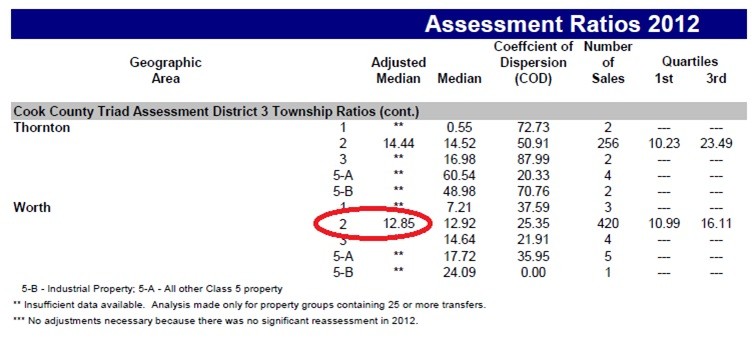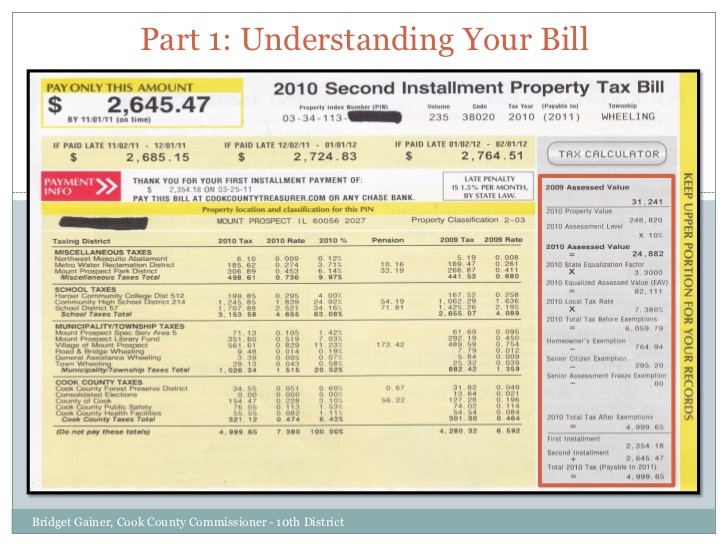How real property taxes are calculated in Cook County
Post on: 13 Июль, 2016 No Comment

Cook County, Illinois residents will get a big surprise in their mailboxes around July 1. Just in time to celebrate the nations birthday, the Cook County Treasurer will come looking for the 2nd installment of 2011 real estate taxes (remember, property taxes are paid in arrears). This year will mark the first time in decades that the bills are not tardy. Most property owners will wonder why their bills are going up when the values of their homes are going down. Its easy to see why once you know the process used by the to calculate a tax bill.
The Calculation
The main job of the Cook County Assessor (yeah, you know, the guy who thinks ethics rules do not apply to him ) is to determine the assessed fair market value of real estate throughout the county. The Assessor conducts a reassessment of the fair market value of Cook County real estate on a triennial basis. The City of Chicago is being reassessed in 2012, the north suburbs are being reassessed in 2013 and the south suburbs are being reassessed in 2014. The results of any reassessment will be reflected in the next tax bill (ie. a reassessment in Chicago in 2012 will show up on the bill that comes out in 2013).
Once the assessor has determined the assessed fair market value of a property, the assessor next calculates the assessed value by multiplying the assessed fair market value times a percentage based upon the property classification of the real estate. In 2008, Cook County passed ordinance 2008-O-51 which reduced the percentages for vacant land and residences to 10%. The assessor does not just stop after the calculation.
Equalized Assessed Value
In order to bring some fairness and uniformity to assessed valuation calculations between different geographical locations, the State of Illinois requires (35 ILCS 200/9-210 ) that property tax assessments are equalized so that the median level of assessment is at 33% of fair market value. Many counties (such as DuPage County) have an equalization factor of 1.0. For 2011, the Cook County equalization factor is 2.9706. In order to determine the Equalized Assessed Value, the Assessed value is multiplied by the State Equalization Factor.
Application of Exemptions
Cook County offers a number of property tax exemptions including the homeowner exemption, senior citizen exemption, home improvement exemption, and long time homeowner exemptions. Before determining a tax bill, the Equalized Assessed Value is adjusted to take into account any property tax exemptions . Each exemption is worth a predetermined reduction in equalized assessed value. Outside of Cook County, the homeowner exemption is equal to $6000 of equalized assessed value. In Cook County, the homeowner exemption (known as the alternative general homestead exemption) under 35 ILCS 200/15-176 ) the old 7% assessment cap law is being phased out. For Chicago properties, the phase out will be complete for taxes related to ownership in 2012, with the north suburbs expiring in 2013 and the south suburbs following in 2014. For 2011, the maximum exemption for the City of Chicago is $12,000 of equalized assessed value. A senior citizen exemption is worth a $4000 reduction in equalized assessed value.

It is always an interesting time when tax bills come out. Local politicians rail against each other pointing fingers to explain tax increases. Most politicians point at the assessor. They make statements like the assessor is out of control or why are taxes going up when property values are going down? These politicians are misleading the public and they know it.
Property taxes are not based on some percentage of property value. Instead, assessed valuation helps to spread the burden of government services evenly among the real estate served by those government services. Property taxes rise and fall not based upon how much a property value goes up or down but based upon how much a property value goes up or down in relation to the other properties within its taxing district.
The County Clerk It is actually the person responsible for backing into the tax rate. A tax rate is set by taking the budget of a particular taxing entity such as a school district or a fire protection district and spreading that cost out over the equalized assessed valuation throughout the district. Therefore, if the entire Citys assessed value went up 10% and budgets remained the same, taxes would be the same as the prior year. In an area where the median property value went up by 25%, a property that was assessed a 20% increase, budgets being constant year over year, would have a reduction in taxes.
On Tuesday, the Cook County Clerk released the tax rates for 2011 taxes . For Chicago, the property tax rate is 5.455. So, in order to determine a propertys tax amount, the treasurer multiplies the equalized assessed valuation after exemptions by the tax rate to determine the tax due.














